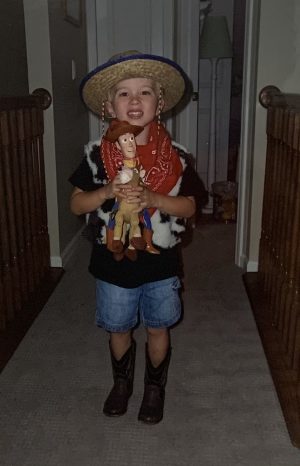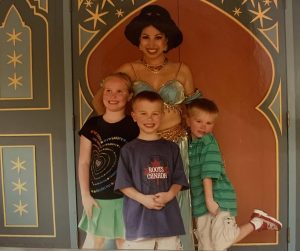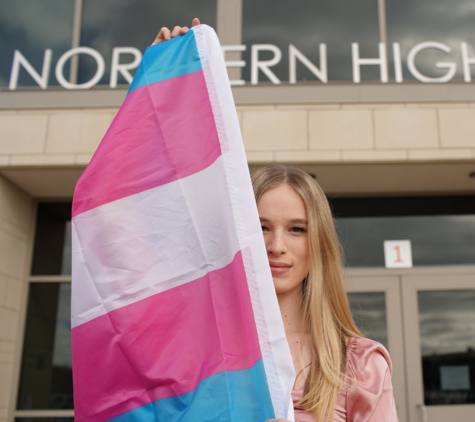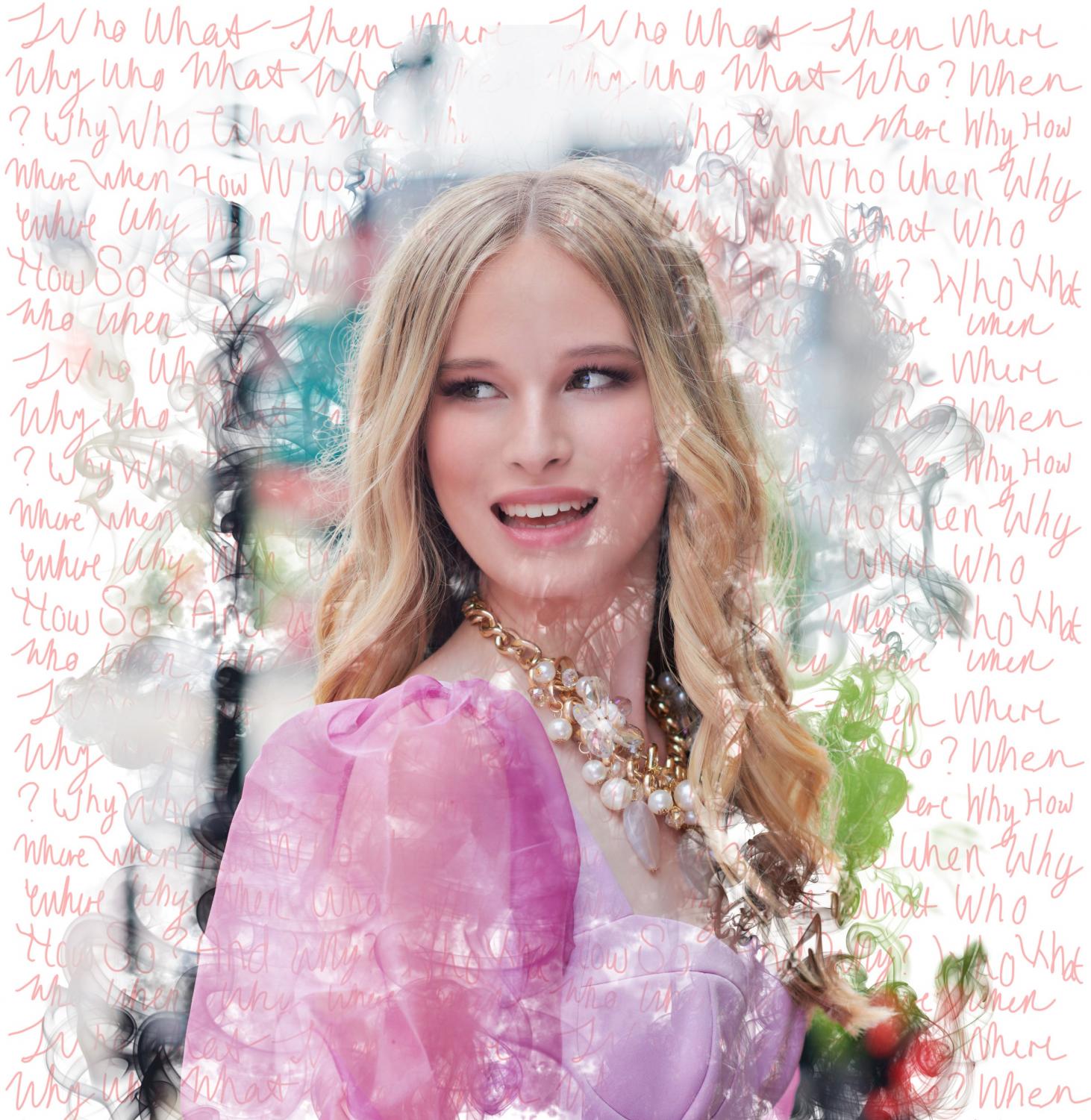The girl with a million questions: the journey to rediscover my voice
March 8, 2021
I spent the first twelve years of my life without a voice.
I spoke words and could form sentences, but these phrases, messages, and expressions of my daily life were meaningless. My words meant nothing because I felt empty.
It’s not that I had nothing to say. I had a lot to say. They called me “the boy with a million questions.” The problem at hand was never my inability to speak, the fact that I talked too much, or my flawed grammar: the error in my speaking all stemmed from the unwritten fact that the one asking questions was never a boy.
It took twelve years to understand that not only were my questions valid, but I had a voice all along.

Growing up, nobody could tell me that I wasn’t a princess. I flaunted my best gowns and danced in my finest slippers. My princess garb may have been jean shorts and cowboy boots, but I wouldn’t allow the limitations of my wardrobe to put a stop to my royal reign. You could find this princess dancing and singing along to Britney Spears, and sometimes she could be spotted in her favorite outfit from the forbidden wardrobe, “borrowing” my mom’s heeled sandals and the life sized barbie’s bonus gown. In these brief moments, I could forget everything. I wasn’t a laughable little boy wearing a silly costume. I was truly myself, and I had a voice. I may have been using it to yell along with “Oops I did it again,” but I had a voice nonetheless. These times when I could truly be myself never lasted long enough. My family would take my princess garb, label it a costume, and place it high above my reach. Without knowing it, these small, seemingly meaningless actions destroyed my self worth, and along with it, my voice.

As the years passed, I no longer felt like a princess, and worse, I felt like I had nothing important to say. I never saw a future for myself: whenever I tried, ideas about upholding masculinity, like being a dad, terrified me. I started to believe that a future with happiness wasn’t in my cards, but even if I couldn’t live a fulfilling life of my own, I had to do whatever I could to support others. This belief was reinforced through my love for film, where I could escape my own circumstances two hours at a time: I slowly realized I wasn’t the inspiring female lead, but the boring side character who existed not for themselves, but purely to further the story of someone more important.
Ironically enough, I believed this narrative for the last time in, of all places, a movie theatre. I was there watching the worst movie I had ever seen: Alexander and the No Good Horrible Bad Day. The film followed a young boy whose everyday life was awful and progressively got worse. Despite the fact that it was miserably made, it was a wake up call: while Alexander’s problems were solved in 81 minutes, mine would be far from over until I was honest about who I was once and for all. Finally, all the pieces of my puzzle came together, and with the proper research, I finally knew how to speak my truth. I was a closeted transgender girl, stuck in the body of a boy.
My life as Kyle finally ended when I worked up the courage to tell my parents. They were supportive, but also apprehensive of the reality that I would face living as a transgender person in America today. Still, it was like my life was beginning all over again. I was truly a toddler navigating my correct gender while at the same time still navigating the already uncomfortable life of a pre-teen. I underwent a long and arduous journey of self-discovery, and at the end of it, I finally found my voice. I felt like a superhero, because my mere existence was up for debate across the world but my powers were limitless. I lived every day to the fullest because I was finally living.

My exponential individual growth didn’t go unnoticed. I faced scrutiny and adversity on a daily basis, and as the first student to transition in my school district, I had a target on my back. I hadn’t anticipated that my true happiness would not just be controversial, but sometimes entirely disparaged, not just by people who knew me, but also by people who had never met me. I didn’t just teach myself to deal with it, I taught myself to be above it.
I entered high school as a trailblazer for the LGBTQ+ community, living happily as the girl I always knew I was. My journey was finally being noticed, and with this I had my first interaction with journalism. I had the privilege of being interviewed by local news, Michigan Radio, People Magazine, Mlive, panels, doctors, and many more. It was a wonderful feeling, being interviewed and celebrated for just being really, truly, authentically me. I started to wonder: what if I could do that for others? What if I could make them feel as safe, seen, valued, respected, and celebrated as I did?
Before long, I became truly infatuated by the world of journalism. It opened doors. It started conversations. It was a compelling way to tell so many deserving, diverse stories. It was raw, honest, and beautiful. Going into my freshman year, I knew I had to join the introductory journalism class. I had the privilege of already experiencing the joy of being the subject of a story, but I just had to learn how to write one myself. In my first year, I took my first attempt at articulating my journey through the angle of my wardrobe. As a senior now looking back on that piece, it was a diamond in the rough, but it was poetic, honest, and a pivotal point of reflection in my transition. I wasn’t just learning how to tell stories: I was learning how to come to terms with mine.
Like my transition, my happiness and journey forward was finally being realized. I didn’t just find myself at home in my new identity, by sophomore year, I found myself at home in my newsroom. I jumped at every opportunity to extend my skills and try my hand at leadership. In my sophomore year, those opportunities were few and far between: there weren’t available spots on the editorial board, but I did succeed in being selected as business manager. Even from that position, I focused on telling the stories of others, and I was given a huge opportunity to interview a friend who was transitioning from male to female. She was experiencing years of gender dysphoria, accompanied by no support at home, but despite her struggles, she was still positive and focused on her happiness. I felt honored and deeply inspired, and at the same time, I felt a tremendous pressure to get the story right. I learned so much from not just knowing her, but being able to share a facet of transgender life that is ignored and belittled by most. The story was bigger than us both, and the best part was that, even in the face of all the scrutiny and transphobia, she was thrilled to have her story shared.
By junior year, I had developed a full-out passion for uplifting the stories of diverse and minoritized students. I knew that this kind of reporting was something that I was uniquely suited for, and so my column, People of the Pack, was born. PoTP was a column dedicated to finding and expounding the untold stories of diverse Portage Northern students. It didn’t just help me grow as a writer, it changed me as a person: because I was learning so much with every person’s story, writing the column was truly a life-changing experience. I knew first hand the importance of representation and visibility, and with every column entry, I grew hungrier and hungrier. I had so many stories to tell, and so little time.
Then, Covid. Starting my senior year virtually, in the middle of a global pandemic, changed something in me. Sharpened something in me. After spending an entire year privileged to report and share the stories of diverse voices, it was time for me to tell my story and use my voice to comment on the parts of our society that were broken, particularly when their sharp edges cut the people who needed to be protected the most. This revelation came with tragically perfect timing, as my entire senior year I’ve been stuck alone in my room with me, myself, and I, not entirely too different than my years spent in isolation with myself and my incorrect gender growing up, but with one important difference: now, I can articulate and use my voice to spread my message. My voice did not tremble when I spoke, and a new column, The Minority Report, became my senior-year focus. I was finally at a point where I was not just able to tell the stories of others, but I had the confidence to reclaim my voice, to write as myself, and to believe that I had valuable things to say. To believe, with conviction, that my voice was strong enough not just to fill words on a page, but to change the world around me.

It took eighteen years, but now, I have a voice.
I’m not just a side character in someone else’s story.
My name is Kylie Clifton, I’m the girl with a million questions.


Isabelle Burnett • May 3, 2021 at 7:23 am
Kylie, you were and are such an inspiration to me during high school. Thank you so much for being that trailblazer for Trans Teens! You helped me realize my own voice and while i’m still figuring it all out, i’m so so so thankful to you for your help.
Katie Knight • Mar 8, 2021 at 1:47 pm
This narrative is so good, Kylie! It’s really inspirational. Also, love the design that you made for this!
Sloan M • Mar 8, 2021 at 12:07 pm
This was such a wonderful article. The raw honesty and well-thought-out execution were beautiful. Congratulations on another amazing piece Kylie! 🙂
Astrid • Mar 8, 2021 at 11:58 am
This piece is so inspiring because it is told in such a unique way that shows questioning or closeted LGBTQ teens that it’s okay to be unsure of yourself or uncomfortable with expressing who you are at the moment. That it’s okay to ask questions about yourself and the world. This article is a success story, it sends the message that you can become confident and strong and a leader, not just in spite of your difference, but actively using that as a way to do what you love: in Kylie’s case, journalism, and how she found her voice by telling the stories of others. What an amazing article!
Olivia Coughlin • Mar 8, 2021 at 11:50 am
Beautiful writing, as always. 🙂